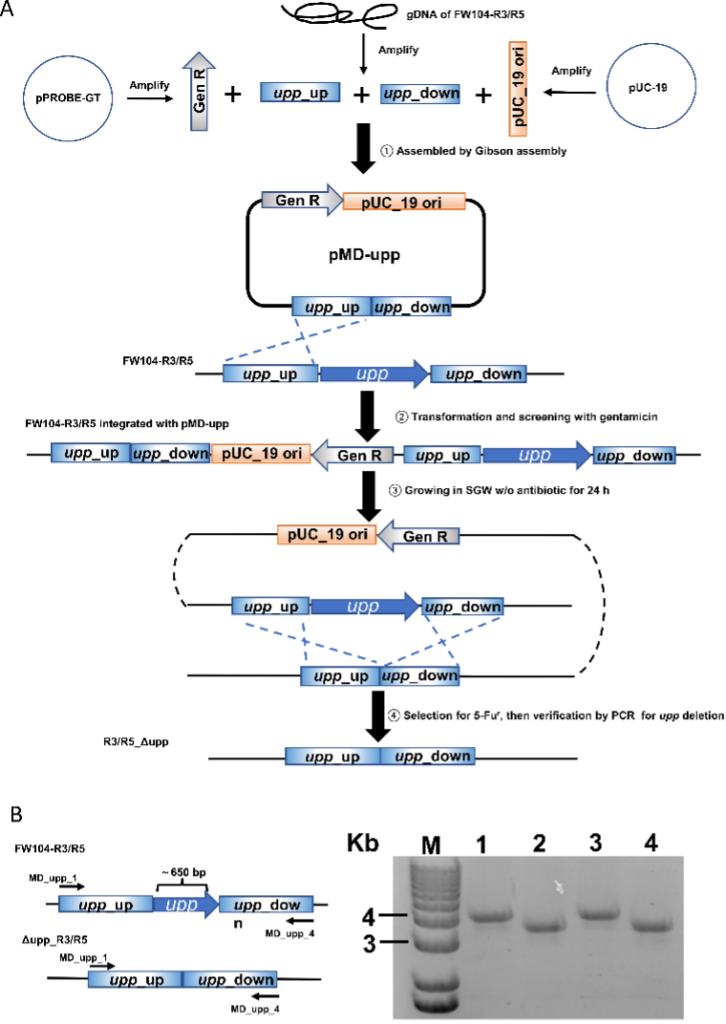Development of a Markerless Deletion Mutagenesis System in Nitrate Reducing Bacterium Rhodanobacter denitrificans

Image courtesy of Xuanyu Tao et al. Applied and Environmental Microbiology (2022); doi:10.1128/aem.00401-22
The Science
Rhodanobacter denitrificans bacterium is capable of denitrification and is also resistant to toxic heavy metals and low pH. Accordingly, the presence of Rhodanobacter species in a particular environment is considered an indicator of nitrate and uranium contamination. These characteristics suggest its potential application in bioremediation of nitrate or concurrent nitrate and uranium contamination in groundwater ecosystems. However, due to the lack of a mutagenesis system in Rhodanobacter denitrificans strains, current understanding of the mechanisms underlying low pH resistance and the ability to dominate in contaminated environments remains limited.
Rhodanobacter denitrificans has been found as the dominate species in aquifers contaminated with high concentrations of nitrate and uranium in Oak Ridge, Tennessee, U.S.A. Here, ENIGMA researchers developed genome editing method (specifically, an in-frame, markerless deletion system) in two R. denitrificans strains, which will allow for future functional genomic studies in these strains.
Impact
This work marks a crucial step in developing Rhodanobacter as a model for studying the diverse mechanisms of low-pH and heavy metal resistance associated with denitrification, and opens up a pathway for using Rhodanobacter in bioremediation applications.
Summary
ENIGMA researchers demonstrated the development and application of an in-frame deletion mutagenesis approach using Δupp-derived 5-FU resistance as a counter-selection marker in two R. denitrificans strains. This method marks a crucial step in advancing Rhodanobacter as a model denitrifying bacterium for the study of denitrification in groundwater ecosystems and diverse molecular mechanisms of low-pH resistance. This is the first report regarding the development of a targeted mutagenesis system in Rhodanobacter species. With the developed genetic manipulation approach in Rhodanobacter, further studies exploring the denitrification process in groundwater, pathways of nitrogen cycling, heavy-metal turnover as well as many other longstanding questions are now possible. In addtion, the in-frame deletion mutagenesis approach can be extended to other species of Rhodanobacter.
Contact

Jizhong Zhou, George Lynn Cross Research Professor; Director, Institute for Environmental Genomics (IEG)
Department of Microbiology & Plant Biology, University of Oklahoma
jzhou@ou.edu

Aifen Zhou
Institute for Environmental Genomics, Department of Microbiology and Plant Biology, University of Oklahoma
aifen.zhou-1@ou.edu
Funding
This material, by ENIGMA (Ecosystems and Networks Integrated with Genes and Molecular Assemblies) (http://enigma.lbl.gov), a Science Focus Area Program at Lawrence Berkeley National Laboratory, based on work supported by the U.S. Department of Energy, Office of Science, Office of Biological & Environmental Research.
Publication
Tao, X., Zhou, A., Kempher, M.L., Liu, J., Peng, M., Li, Y., Michael, J.P., Chakraborty, R., Deutschbauer, A.M., Arkin, A.P. and Zhou, J. (2022) Development of a Markerless Deletion Mutagenesis System in Nitrate-Reducing Bacterium Rhodanobacter denitrificans. Applied and Environmental Microbiology, pp.e00401-22; [DOI]:10.1128/aem.00401-22
